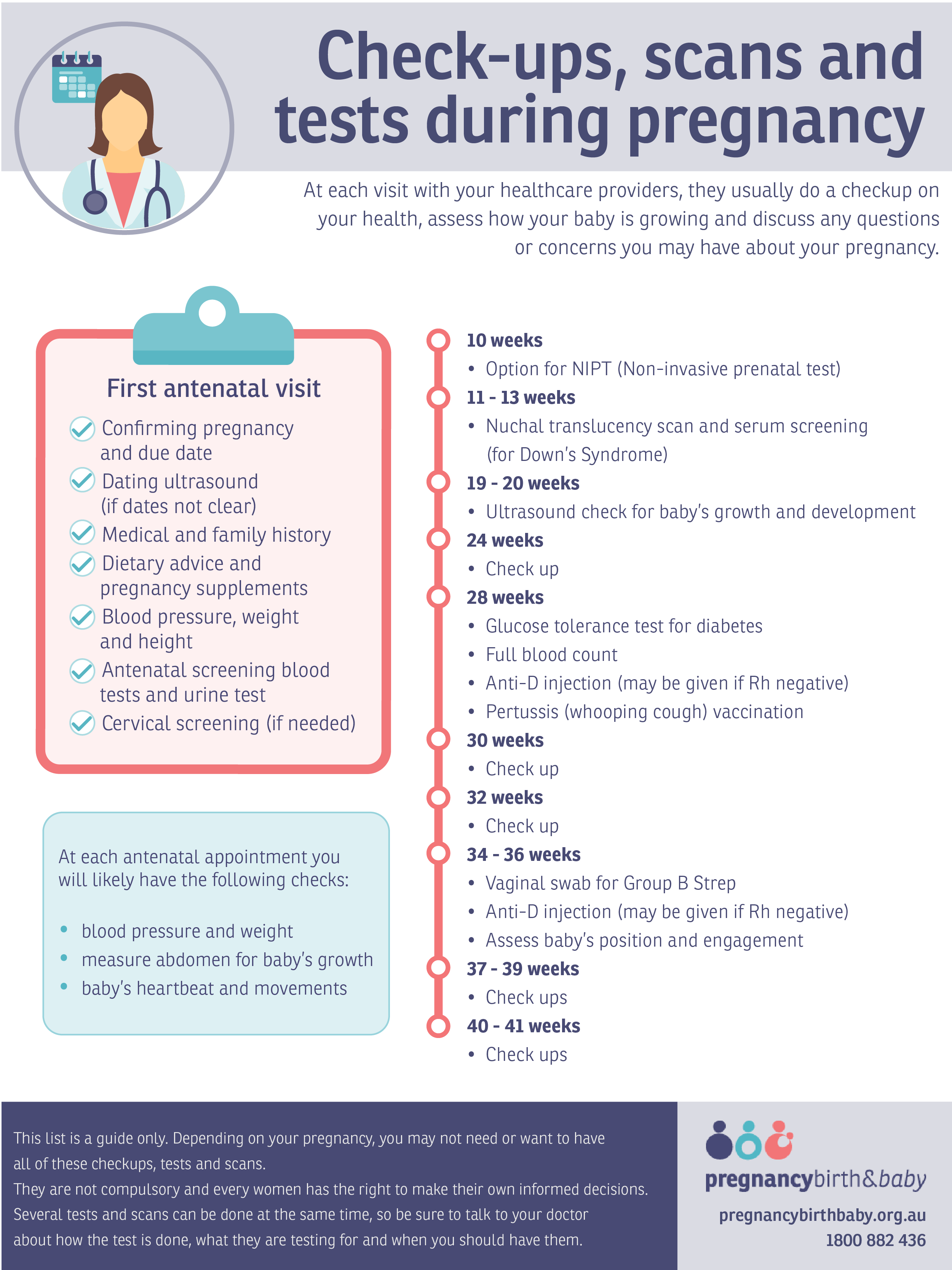Antenatal care during your pregnancy
5-minute read
What are antenatal appointments?
Once your pregnancy is confirmed, it’s important to see your GP or a midwife as soon as possible so you can schedule the appointments you will need. Appointments during your pregnancy are called your antenatal appointments or antenatal care.
Why go to antenatal appointments?
Antenatal appointments will allow your GP, midwife and other people on your healthcare team to help both you and your baby stay healthy. Even if your pregnancy is going well and you’re feeling well, it’s important for you to attend your appointments so that any potential risks can be identified and prevented, or reduced.
It’s also a great opportunity to ask any questions you have about your pregnancy such as what's happening during each trimester, physical pregnancy symptoms and the birth itself. You may want to ask questions about caring for your baby after the birth.
You can also get support to help you with your lifestyle, including mental health or dietary advice, or help quitting smoking or avoiding drinking alcohol. You can discuss any problems you might be having at home.
Who will I be seeing at my antenatal appointments?
You may want to see your own GP first, before choosing a midwife. It’s up to you.
It can also depend on whether you’re planning to give birth at a public hospital. If so, it’s likely that you will see a doctor or midwife at the hospital.
If you’re planning to give birth at a birth centre, you will probably have your appointments with the midwife at the birth centre.
If you intend to have your baby at a private hospital, your appointments will most likely be with your obstetrician in their rooms.
If you’re planning to have a home birth, your antenatal care will probably be provided by a midwife in your home, the hospital or elsewhere in the community.
What will happen during the appointments?
The antenatal care you get throughout your pregnancy depends on:
- your health and any risks you or your baby may have
- your stage of pregnancy
- any problems you may be experiencing
There will be a number of checks, scans, tests and discussions, such as:
- when the baby is due, what trimester you are in and what this means for you and your baby
- finding out about your medical history, general health and how any previous pregnancies were
- discussing any medication you are taking
- ensuring you are up to date with cervical screening
- making sure your mental health is OK, and supporting you if you have depression or anxiety
- checking your blood pressure and weight and testing your urine
- organising blood tests and screening
- providing advice on healthy eating and lifestyle changes
- feeling and measuring your tummy, and listening to the baby's heartbeat
- asking you about your home environment, work and what support you have. If you are experiencing family violence, this is a good opportunity for you to discuss it
- checking about any physical symptoms that may be bothering you
- running through your birth plan with you
- talking about if something doesn't go to plan during the birth
- finding out about antenatal classes
- advice about taking your baby home, feeding them and other care
How many antenatal appointments will I have?
If this is your first pregnancy and you’re not experiencing any problems, it’s likely you’ll have about 8 to 10 appointments. Your GP or midwife will give you an appointment plan during your first antenatal visit.
If this is not your first pregnancy, you’ll probably have 7-9 appointments if you had an uncomplicated pregnancy before.
The number of visits can change depending on whether your pregnancy becomes complicated. If it does, your midwife or doctor may need to increase the number of appointments and you may need more tests and scans. You can also organise to see your doctor or midwife if you have any problems or concerns.

Checkups, scans and tests
Find out what checkups, scans and tests you might have during your pregnancy.
Can my partner come along too?
Yes. It’s a good idea for your birth support partner, family member or friend to come to your appointments with you, particularly when discussing your birth plan and if you want them to support you during the birth.
Resources and support
If you have any questions about antenatal care or concerns about your pregnancy, contact:
- Pregnancy, Birth and Baby on 1800 882 436 to speak to a maternal child health nurse
- your GP
- your midwife
- the hospital where you're planning to give birth
Speak to a maternal child health nurse
Call Pregnancy, Birth and Baby to speak to a maternal child health nurse on 1800 882 436 or video call. Available 7am to midnight (AET), 7 days a week.